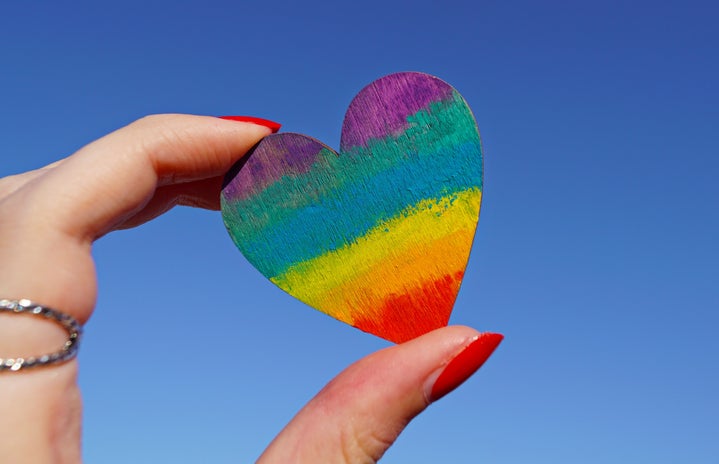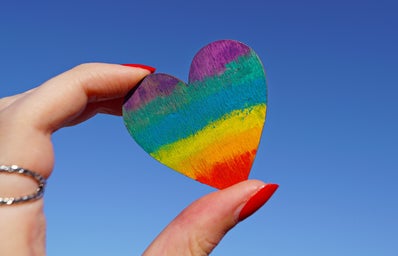What ice cream do you like? Let’s assume that you like vanilla. What about your friend? It’s likely your friend prefers a different flavor of ice cream, for example, mint. In this case, your preferences are completely different. This phenomenon occurs fairly often. We are all different – our interests and preferences are not the same -, but this does not mean we will start to ignore or bully each other because of these distinctions. We are all unique and diverse meaning we do not always share what we love and what we do not love. However, it does not transform our friends into allies because our friendships are built on a personal characteristic rather than sharing the same preference. Would you kill your friend because he/she does not like your favorite flavor of ice cream? Probably not. Then why is it normal to bully, target or even kill a person because they do not share your preferences in terms of sexual orientation?

According to the FBI’s 2014 hate crime statistics database, “1.115 crimes of gays were motivated by bias against sexual orientation or gender identity” (Koeze). Those people were killed because of their dissimilarity to the majority, despite the fact that those who identify as gay are simply normal people who have some preferences that differ from the majority. Who is this mysterious person who we call “gay”? According to the Cambridge Dictionary, “gay” means “being sexually attracted to people of the same sex and not to people of the opposite sex.” Unfortunately, there are several individuals who do not like homosexuals. Even the idea that people who identify in such a manner exist scares many. Their fear comes from some big misunderstandings and one of them is that individuals decide to be gay on purpose in order to attract the attention of others. Thus, society’s acceptance of gays might influence other people to become representatives of the homosexual group.
This way of thinking is pretty common but, in 2008, the American Psychological Association refuted that by saying, “most people experience little or no sense of choice about their sexual orientation” (Sprigg), thus asserting that nobody can force people to become a homosexual, nor can they force gays to change their sexual orientation. Individuals do not control their ability to feel attracted to someone. Hence there is a specific biological factor that plays a major role in having a specific sexual orientation. The attempts of others to change gays/lesbians are useless because we have yet to find a way to transform a person’s biology. People do not choose to be gay in order to distinguish himself/herself from others; they are biologically programmed to become homosexual. Therefore this kind of behavior is just another norm that was established by nature.
Another misapprehension that influences people’s negative attitudes towards gays is their confidence in the fact that religion is completely against homosexuals. Individuals often refer to the words of the Bible, saying that religion does not support this kind of relationship. It should be noted here that we all forget that the Bible does not mention anything about homosexuality because it was written before the time when this word was created, “The writers of the Bible had neither the understanding of it nor the language for it” (Creech), so it could not establish particular point of view about it. Jimmy Creech, former United Methodist pastor for nearly 30 years, is sure that people’s inaccurate interpretation of the Bible is the root of all misunderstandings and discrimination. He mentions that Bible refers to same-gender sexual behavior (note: it does not say “homosexual”) in a negative way, but in the context of violence that can be created among people with the same gender: “what is condemned in these passages is the violence, idolatry and exploitation related to the behavior, not the same-gender nature of the behavior” (Creech). This passage has been wrongly interpreted by a lot of people whose concern was to find some facts that would prove that they have been right in targeting gays, their purpose was not to find the truth. The truth is the Bible does not say anything about homosexuality, and the only thing that it forbids is the violence among the people of the same sex, not love. Despite the negative attitude of religious people, gays do not deny their beliefs and continue following their chosen religions. Jaweed Kaleem in his article, “Religious Views Among Lesbian, Gay, Bisexual, Transgender People Revealed In New Survey”, asserts that “51 percent of gays, do have a religion, and 17 percent of them say religion is ‘very important’ in their lives”. There are a lot of people who are engaged in homosexual relationships, but at the same time are very religious. For instance, Abbey Thornton, one of the lesbians who participated in the survey, said that, “In reality, I really care about my relationship with God and my faith is important to me, and I know now that being who I am and being with who I love doesn’t invalidate that” (Gander). Having religion helped her to overcome the negative attitudes she has faced from the majority throughout her life due to her sexual orientation. It also shows that being gay did not make her an evil monster – instead, it made her value the religion even more.

Another person who experienced discrimination because of his choice and who found the support in his faith was Luke Dowding, a 29-year-old gay man, who asserted, “The reality is the power of self-acceptance and reconciliation of my faith with my sexuality” (Gander). He was looking for succor in the religion as all people in need do when they face unfair discrimination. Abbey, Luke and others who have experienced any negative attitudes towards them attended church to find the support offered there. Is it not the purpose of religion to help people and support them? To see them equally regardless of all factors? Why can the person who cheated to go to church and be excused, but a person who has never cheated and truly loved only one individual not deserve anything because of some difference in sexual preferences?
People discriminate against others because of misunderstandings that appear due to lack of knowledge about a particular topic. This does not excuse them – a lot of people suffer and try to hide their identity because, if they do not, they may be tortured for it. Gays are targeted because others value the sexual orientation of a person over his/her personality, achievements, and character. They are killed because most of us prefer to get rid of things that are different rather than trying to understand it. People are afraid of gays because it seems unnatural for them and dangerous, but the only danger that exists in the world is represented by those who target others. I think these people should be afraid of themselves.



